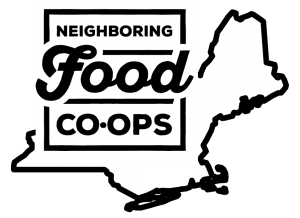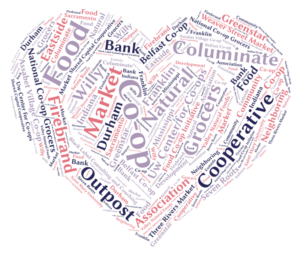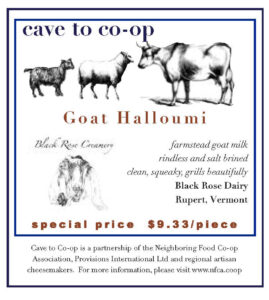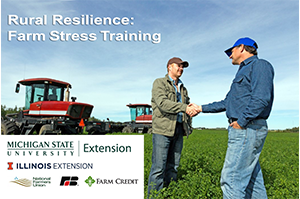 Your Neighboring Food Co-ops
Your Neighboring Food Co-ops
Locally Owned by More Than
150,000 People Like You!
In this Month’s E-News, check out:
- We’re Here…and Virtually Everywhere!
- Join Us Online at the NOFA Summer Conference
- Farm to Freezer: Homemade Blueberry Ice Cream!
- July’s Cave to Co-op Cheese Special: Goat Halloumi from Black Rose Dairy
- New England Farmers Union: Free Stress Management Resource
- Co-op Calendar: The NOFA Summer Conference is Online
We’re Here…and Virtually Everywhere!
As conferences and gatherings go online, NFCA staff have been there, sharing about the good work our food co-ops are doing to keep our communities healthy and safe.
One of the highlights of summer for food co-ops is the annual CCMA conference, organized  by the University of Wisconsin Center for Cooperatives. Due to the pandemic, this year’s gathering was held online in early June, bringing together over 820 cooperators from 95 co-ops in 32 states and Canada for a week inspiring speakers, workshops, and networking. Bonnie Hudspeth, who leads Co-operative Development for the NFCA, moderated a panel on “Serving Your Community During an Economic Downturn,” sharing how co-ops are responding to unmet needs of their members and communities during the pandemic, and are working to help rebuild.
by the University of Wisconsin Center for Cooperatives. Due to the pandemic, this year’s gathering was held online in early June, bringing together over 820 cooperators from 95 co-ops in 32 states and Canada for a week inspiring speakers, workshops, and networking. Bonnie Hudspeth, who leads Co-operative Development for the NFCA, moderated a panel on “Serving Your Community During an Economic Downturn,” sharing how co-ops are responding to unmet needs of their members and communities during the pandemic, and are working to help rebuild.
Because they are focused on meeting member needs before short-term profits, food co-ops can be more nimble, shifting their operations in response to local needs. During the pandemic, co-ops in our region have worked hard to keep shoppers and workers safe while maintaining employment and supporting local producers. Looking forward, they can help our communities rebuild more sustainably.
For many years, the NFCA has also sponsored and presented at the Slow Living Summit, usually held in June in Brattleboro, VT, during the Strolling of the Heifers. This year’s summit was held online over the course of a number of days, organized around the theme, “Take a Bite Out of Climate Change”.
Frances Moore Lappé, author of numerous books including Diet for a Small Planet, opened the conference with a presentation on how “following the food” can help us grasp the roots of the climate crisis that lie within our failing mindset about democracy, the market system, and the meaning of freedom. “Food is the single most powerful lever for addressing climate health and personal health,” she said, pointing to the need for a more democratic economy. “I don’t think Americans appreciate how important the co-op movement is.”
Continuing on this theme, the NFCA’s Bonnie Hudspeth participated in a panel on “Co-operative Ownership” with Matt Cropp of the Vermont Employee Ownership Center, Addie Rose Holland of the Real Pickles Co-op, and Robert Miller of the credit union VSECU. Speakers emphasized how past economic and social crises have spurred waves of co-operative development and how co-ops are responding to the challenges of the COVID-19 crisis.
Hudspeth shared the how food co-ops have an outsized impact in the regional food system and economy, and how they can play an important role in rebuilding from the pandemic in a way that is more just, sustainable, and resilient.
Coming up later this summer, NFCA staff will also be presenting at the online NOFA Summer Conference (See next story) and at the Radically Rural conference in September.
Join Us Online at the NOFA Summer Conference
The NOFA Summer Conference is going online — and we’re sharing how co-ops help build a more resilient food system and economy.
The latest edition of the NOFA/Mass Newsletter describes how food co-ops contribute to a  more healthy, just, and sustainable regional food system and can help our communities as we rebuild from the COVID-19 pandemic. Food co-ops have also been leaders in growing the market for organic farmers, and last year our member co-ops sold $97 million in organic products, reporting an average of 34% of store sales (compared with a national grocery store average of just 5%). Organic agriculture not only supports the health of consumers, workers, and our environment, but has been recognized as a key tool in combatting the impacts of climate change.
more healthy, just, and sustainable regional food system and can help our communities as we rebuild from the COVID-19 pandemic. Food co-ops have also been leaders in growing the market for organic farmers, and last year our member co-ops sold $97 million in organic products, reporting an average of 34% of store sales (compared with a national grocery store average of just 5%). Organic agriculture not only supports the health of consumers, workers, and our environment, but has been recognized as a key tool in combatting the impacts of climate change.
Since 2012, the Neighboring Food Co-op Association (NFCA) has partnered with NOFA/Mass to support education and advocacy on organic agriculture. And as this year’s NOFA Summer Conference goes online from July 20 to August 9, NFCA staff and partners will be presenting on the role of co-ops in a more sustainable food system and economy:
- “How to Start or Convert to a Co-operative Business,” on Monday, 7/27 from 7-8:30 PM in Zoom Room B will focus on how co-ops root business in communities, strengthen buy-in, and build a resilient and sustainable economy. This workshop will cover how co-ops work, the start-up process, and the benefits of converting to the co-op business model for owners of food/farm businesses. Presented by Bonnie Hudspeth, NFCA’s lead in Co-operative Development, and Adam Trott, Executive Director Valley Alliance of Worker Co-ops & Shared Capital Co-operative, Member Relations Director.
- “Expanding Outlets for Your Farm Products,” on Wednesday 7/29 5-6:30pm in Zoom Room A, is designed for producers interested in offering their products in food co-ops across our region. Food co-ops make a priority of supporting local farmers and producers, fostering farm sustainability through long-term relationships, transparency, and sales channels that offer volume, marketing, and stable, year-round markets. Presented by Suzette Snow-Cobb, NFCA Sourcing Coordinator, with Jacob Vincent, Merchandising Manager, Co-op Food Stores.
For more information and to register, visit https://nofasummerconference.org/register-now-2/.
Remember that members of NFCA member co-ops receive a 20% discount on registration with the code “COOP2020”.
Farm to Freezer: Homemade Blueberry Ice Cream!
Keep it Cool with Homemade Blueberry Ice Cream!
Your local food co-op has the ingredients to create cool treats and keep local farms thriving.  Knowing what’s in your food is important and when you purchase the NFCA’s Northeast Grown Frozen Fruits & Vegetables, you are not only making a good decision for yourself and your family, you are helping to grow the regional food system and economy.
Knowing what’s in your food is important and when you purchase the NFCA’s Northeast Grown Frozen Fruits & Vegetables, you are not only making a good decision for yourself and your family, you are helping to grow the regional food system and economy.
Summer means ice cream! With homemade ice cream you know just what the ingredients are so you can meet dietary needs and still enjoy a cool treat. Whether you have a crank ice cream maker or use the freezer method, use cream or vegan alternative, making your own ice cream can be a fun activity and nutritional to boot. Blueberries have one of the highest contents of antioxidants, they are low in calories but high in fiber, vitamin C and vitamin K.
While local, fresh blueberries are an excellent choice for every-day snacking, frozen berries are generally picked at peak ripeness and research shows that flash freezing preserve their nutritional value. NFCA frozen blueberries are IQF frozen (flash frozen) enabling retention of all the great nutritional qualities to add to your cool summer treats!
By working together, food co-ops across our region are making regionally grown produce available to our shoppers year ‘round. For more Farm to Freezer information and recipes — including warm weather recipes great for summer meals using frozen corn, peas, or blueberries — visit: www.nfca.coop/farmtofreezer.
Stock up on Farm to Freezer Blueberries to make these frozen treats and more!
No Crank Ice Cream Recipe
- 1 / 10 oz pkg of NFCA Frozen Blueberries)
- 1 tsp Lemon Juice & Zest
- 16 oz. Heavy Cream
- 1 / 14 oz Can Sweetened Condensed Milk
Directions
- In a food processor, puree the blueberries then transfer to a medium saucepan.
- Working over medium heat, add lemon juice and zest. Bring mixture to a boil then reduce heat. Simmer until slightly reduced, about 15 minutes.
- Transfer to a bowl and cool in refrigerator, 1 to 2 hours.
- In a large bowl beat heavy cream until stiff peaks form. Fold in sweetened condensed milk until fully combined, then fold in chilled blueberry puree.
- Transfer to 9″ x 5″ loaf pan and freeze until firm, about 5 hours.
Vegan Ice “Cream”
- 1 / 10 oz pkg of NFCA Frozen Blueberries
- 1 ½ cups plain unsweetened cultured coconut yogurt or coconut cream from one 13.4 oz can of coconut milk (whipped until soft peaks form)
- 1 tbsp maple syrup
Directions
- Blend blueberries and syrup in a food processor.
- Fold blended blueberries into the whipped coconut cream (or coconut yogurt) and mix gently until combined.
- Place covered in the freezer and allow to freeze for 1 hour.
- Whisk slightly every 20 minutes to avoid it getting too icy over the next 3-4 hours. It should be getting thicker after each whisking, until it’s firm enough to scoop.
For more Farm to Freezer information and recipes visit: www.nfca.coop/farmtofreezer
July’s Cave to Co-op Cheese Special: Goat Halloumi from Black Rose Dairy
Goat Halloumi from Black Rose Dairy, Rupert, VT
Black Rose goat milk Halloumi is a beautiful rindless cheese. It keeps its shape when grilled  or seared and is crisp on the outside and creamy and squeaky on the inside. Made from pasteurized, farmstead goat milk by Caitlin Pettini the cheesemaker at Black Rose Creamery.
or seared and is crisp on the outside and creamy and squeaky on the inside. Made from pasteurized, farmstead goat milk by Caitlin Pettini the cheesemaker at Black Rose Creamery.
Black Rose Creamery is located at Róisín Dubh Farm in the town of Rupert, in southern Vermont. Caitlin raises primarily Nubian goats, as the breed is known for high quality production and high butterfat content making their milk ideal for cheese making. The herd started out in 2009 with Frankie and Flynn, two Nubian wethers. Today Caitlin and her family milk forty Nubian and Nubian-cross goats.
These little goats are their livelihood, so they are looked after with the utmost of care. With acres to roam and hills to climb, Black Rose goats live a happy existence, munching on grass and underbrush as they laze about in the sun. The farm puts great importance on socializing their goats to make certain the milking process is safe for both the goat and milker. This process begins at birth by hand-feeding newborn kids and making sure they get plenty of cuddle time. As they grow older, Caitlin sits with them and brushes their coats frequently to maintain a trusting relationship.
Try Halloumi in a summer salad or with any variety of vegetable dishes. Check out the recipes on our July Cave to Co-op page.
In these times and with the challenges in our food supply, now it is as important as ever to strengthen our local and regional farmers and producers and support artisanal cheesemakers. Cave to Co-op is a partnership between Provisions International and the Neighboring Food Co-op Association (NFCA) to support artisanal cheese producers in our region and make their products more easily available to co-op shoppers. Since the program’s inception, ten years ago, 26 tons of local cheese have been sold through the Cave to Co-op program. That is a lot of delicious cheese!
For more information on Cave to Co-op, visit www.nfca.coop/CaveToCo-op
New England Farmers Union: Free Stress Management Resource
What is Farm Stress and how can you help? Farmers Union joins other groups in offering a free online training to connect family farmers with resources for support.
Building on a farm stress management online training course for employees and members  of Farm Credit, Farm Bureau and Farmers Union, these organizations have supported the launch of a free online training available to the general public.
of Farm Credit, Farm Bureau and Farmers Union, these organizations have supported the launch of a free online training available to the general public.
Developed by Michigan State University Extension (MSU Extension) and University of Illinois Extension (Illinois Extension), the course will help farmers, their families and neighbors identify and cope with stress. It provides participants the skills to understand the sources of stress, manage their own stress, learn the warning signs of stress and suicide, identify effective communication strategies, and connect farmers and ranchers with appropriate mental health and other resources.
The challenges of ongoing low commodity prices, trade wars and extreme weather events have dramatically affected farmers and ranchers for years. Add the COVID-19 pandemic and its economic disruptions and that stress multiplies. Stress among farmers and ranchers is felt throughout farm operations and seeps into cities and towns across the country.
This online course builds upon past training materials Michigan State University Extension developed beginning in 2016, and tailored for the U.S. Department of Agriculture’s Farm Service Agency in 2019. Additional courses and specific training have since educated employees and members of Farm Credit, Farm Bureau and Farmers Union nationwide.
“Farm families across the country already faced low prices, disastrous weather, uncertain trade prospects, and then the COVID-19 pandemic hit. It’s a heavy load to carry. We hope farmers and their families and others in rural communities that are feeling stressed will take this free training and use the tools provided to get help coping with this unprecedented situation,” said Farm Credit Council President and CEO Todd Van Hoose.
“We have to break through with a message of hope and help,” said American Farm Bureau Federation President Zippy Duvall. “Families don’t have to face today’s stresses and heavy burdens alone. This free online resource is a first step toward recognizing the signs and knowing what to do. We hope anyone who knows someone struggling will take advantage of this potential lifeline.”
“These are especially difficult times for farmers and ranchers, but because three in five rural Americans live in areas without enough mental health care providers to adequately serve the population, help isn’t always readily available. The pandemic hasn’t made things any easier; social distancing requirements have limited in-person care, and many farmers have lost off-farm jobs that provided their health insurance. These circumstances have made the community-led mental health strategies taught in this online training all the more critical,” said National Farmers Union President Rob Larew.
Anyone can register for the free, online training course. It is funded by a grant from Farm Credit and supported by MSU Extension and Illinois Extension.
Your Local Farmers & Fishermen Need You!
If you care about where your food comes from and want to support the people who produce it, consider joining NEFU as a Friend of the Farmer for just $15. Your membership will help ensure that our region’s producers and consumers are heard by policy makers here at home and in Washington, DC. For more information, please visit www.newenglandfarmersunion.org.
Co-op Calendar: The NOFA Summer Conference is Online

Climate Solutions Are Grown In Soil: July 20 — August 9
The NOFA Summer Conference is mooooving online! This online experience — co-sponsored by your Neighboring Food Co-ops — will be spread out over three weeks from July 20 – August 9, 2020.
For more information and to register, visit https://nofasummerconference.org/.
(Members of NFCA Food Co-ops receive 20% off registration with the code “COOP2020”.)
For More Co-op Events, Visit https://nfca.coop/calendar
JULY 2020
July 20 – Aug 9
NOFA Summer Conference: Climate Solutions Are Grown In Soil – Now Online!
https://nofasummerconference.org/
Members of NFCA Food Co-ops receive 20% off registration with the code “COOP2020”.
Don’t forget to check out our co-op track workshops, including “How to Start or Convert to a Co-operative Business,” with the Valley Alliance of Worker Co-ops, and “Expanding Outlets for Your Farm Products,” for producers interested in marketing their products to food co-ops.
AUGUST 2020
August 13-15
Federation of Southern Co-operatives 52nd Annual Meeting
https://www.federation.coop/events
SEPTEMBER 2020
September 24
Online Workshop: “Rebuilding our Rural Communities, Co-operatively!“
Radically Rural Conference
https://radicallyrural2020.sched.com
OCTOBER IS CO-OP MONTH!
October 7-9
NCBA CLUSA Co-op Impact Conference, Washington, DC
https://ncbaclusa.coop/2020-co-op-impact-conference/
October 8
Co-operative Hall of Fame, Washington, DC
Saturday, October 17
Columinate Co-op Cafe (Co-Hosted by NFCA)
https://columinate.coop/co-op-cafe-2020-resources/
The Neighboring Food Co-op Association (NFCA) is a co-operative federation of 35 food co-ops and startup initiatives across New England, working together toward a shared vision of a thriving co-operative economy, rooted in a healthy, just, and sustainable food system and a vibrant community of co-operative enterprise.

